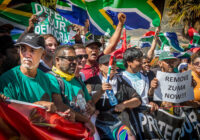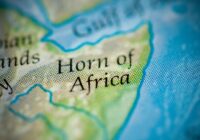The ANC’s ability to pivot and unite around a new candidate displays a degree of unity that bodes well for its ability to weather future electoral contests.
On February 14, Jacob Zuma resigned as president of the Republic of South Africa, a position that he had held since 2009. The African National Congress (ANC) leader is leaving behind a legacy marred by graft on a grand scale, economic malaise and heightened racial tensions. While many are happy to wish Zuma good riddance, the level of optimism regarding his successor, Cyril Ramaphosa, is mixed.
Some consider the changing of the guard a new dawn for South Africa. Zuma’s time in office, during which he became embroiled in a dizzying number of scandals, was generally deleterious for the ANC in terms of political support. In the 2016 municipal elections, the ANC saw its worst electoral performance since the end of apartheid in 1994. The party’s reputation fell along with Zuma’s approval ratings, due to events such as the 2012 Marikana Massacre, Nkandlagate and allegations of state capture by the influential Gupta brothers. The Zuma era saw a deepening of corruption and of political and economic divisions between South Africans that will take significant time and effort to remedy.
Cyril Ramaphosa provides hope to those who believe in ANC regeneration. He is famous for his business acumen and for being Nelson Mandela’s chosen successor. He is one of the wealthiest men on the African continent and has a history as a former union organizer, longtime ANC member and deputy president under Zuma.
One of the most significant scars on Ramaphosa’s resume is his implication in the Zuma administration’s most egregious tragedy: Ramaphosa was on the board of the Lonmin mine at the time of the Marikana Massacre, and some say he may have pushed for police intervention, which led to escalation and the death of 34 striking miners. Although he was absolved of guilt in the official inquiry, this story contributes to the perception of Ramaphosa as someone who has benefited immensely from a political and economic system that has left out so many, especially black, South Africans. In other words, he is, as Norimitsu Onishi writes in The New York Times, a “symbol of an A.N.C. elite that had lost touch with its base,” who failed to substantively critique President Zuma until it was no longer in his political interest to fall in line.
Despite Ramaphosa’s faults, pushing Zuma to step down and swiftly mobilizing around his successor was a smart move for the ANC as it contemplates the 2019 elections. Ramaphosa will likely grant the ANC a higher degree of electoral stability and a potential to extend its control of the country for the foreseeable future. ANC dominance — while bruised by Zuma’s presidency, pervasive economic inequality and lack of mobility for many black South Africans — remains virtually assured due to the strong historical ties between the party of Nelson Mandela to the end of apartheid era. The ANC’s ability to pivot and unite around a new candidate displays a degree of unity that bodes well for its ability to weather future electoral contests.
It remains to be seen what a Ramaphosa presidency will mean for South Africa, politically, economically and socially. On a hopeful note, Ramaphosa has used his first speeches to underlie his commitment to serving the South African people and to addressing the problems of corruption and state capture. However, graft has been endemic in South African politics, and it requires more than a single individual — no matter how powerful — to undertake systemic reform.
Stamping out corruption depends on how serious Ramaphosa, his party and other South African leaders are about eliminating this scourge from the country’s political culture. What is clear is that Zuma’s departure does not mean that all ANC failures have been absolved. After all, as Stephen Groots writes in the Daily Maverick, “Ramaphosa is no hero … the ANC is still corrupt.” It will take time and concerted action on the part of South Africa’s leadership to fix what is broken and ensure a better future for all South Africans.
The views expressed in this article are the author’s own and do not necessarily reflect Fair Observer’s editorial policy.
Photo Credit: Paul Stringer / Shutterstock.com
Support Fair Observer
We rely on your support for our independence, diversity and quality.
For more than 10 years, Fair Observer has been free, fair and independent. No billionaire owns us, no advertisers control us. We are a reader-supported nonprofit. Unlike many other publications, we keep our content free for readers regardless of where they live or whether they can afford to pay. We have no paywalls and no ads.
In the post-truth era of fake news, echo chambers and filter bubbles, we publish a plurality of perspectives from around the world. Anyone can publish with us, but everyone goes through a rigorous editorial process. So, you get fact-checked, well-reasoned content instead of noise.
We publish 2,500+ voices from 90+ countries. We also conduct education and training programs
on subjects ranging from digital media and journalism to writing and critical thinking. This
doesn’t come cheap. Servers, editors, trainers and web developers cost
money.
Please consider supporting us on a regular basis as a recurring donor or a
sustaining member.
Will you support FO’s journalism?
We rely on your support for our independence, diversity and quality.






